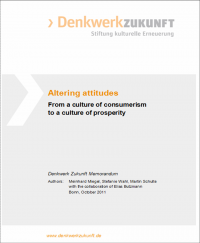Back to Contributions and Publications
Altering attitudes - From a culture of consumerism to a culture of prosperity
Key findings:
1. The societies of early industrialised countries are consumer societies: theirs is a culture of consumerism. This poses a dilemma in that the foundation of this consumer culture is disintegrating. Ongoing economic growth and the maximisation of material wealth are key prerequisites in ensuring that this culture continues. But in future, material wealth will decline across broad sections of society.
On the one hand, the generations-long exploitation of natural resources and the environment, and also of people and society, has reached its limits. On the other, in today's ageing societies both production capacity and the willingness to embrace risk are on the decline. A third factor is the sheer impossibility of material wealth being upheld by taking on ever more debt.
2. In societies that focus, as Germany does, on increasing consumption and the maximisation of material wealth, any loss in both is bound to spark tension and could cause considerable unrest. If this is to be avoided or at least alleviated, the principles of individual happiness and the ability of society to function must be adapted to the altered conditions.
This is reliant on cultural renewal. The narrow focus on consumption and material wealth must be broadened, and perceptions of wealth must be expanded to take in non-material factors. Taking time for oneself and for others, and also taking time to enjoy nature and the arts, to learn new things and broaden one's horizons, and perhaps to learn a new language, to play sports, to relax and do nothing, and to become involved in local politics or community activities. For a broader perception of wealth, economic practices and lifestyles are necessary that are incomparably more sustainable than those embraced in consumer cultures.
3. Large parts of society are ill prepared for such change in attitudes. While the number of people who believe that existing economic practices and lifestyles cannot be sustained has been on the increase for quite some time, they have failed to follow their words with actions. This is because it is extremely difficult to persuade others to turn their backs on their familiar, deeply rooted behaviour patterns. Such change can take generations.
Given the challenges that come with climate change, ever-scarcer resources and increasing social conflict, there is only a very tight time window in which to alter people's attitudes. To do so as quickly as possible, a wide range of individual and collective forces must be activated.
4. Society must develop less materialist lifestyles by means of an open, broad-based search process. An important part can be played by those who act as role models and/or are able to contribute more and take wide-focused action due to their above-average skills, abilities, income and assets. Unless they show a stronger sense of community and commitment, at some point or other, society will lose its long-term ability to function.
5. A special responsibility lies with the media, the education sector and non-governmental organisations (NGOs). They must provide people with targeted information about the risks inherent in their current materialistic lifestyles and help them develop the skills and abilities they need to lead fulfilled lives with less.
6. Given the short timeframe, the switch from material to less-material perceptions and behaviours must be driven by the state. It must break down the barriers that stand in the way of non-material living, end promotion of resource-intensive economic practices and lifestyles, and intensify measures aimed at reducing resource use. And what the state must also do is design social security systems and policy structures that afford people an adequate level of security even in the face of dwindling material wealth. Finally, it must lobby for cultural renewal at international level.
Report: Altering attitudes. From a culture of consumerism to a culture of prosperity. (PDF)




